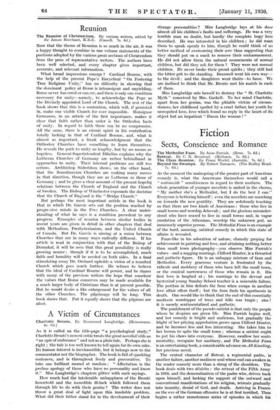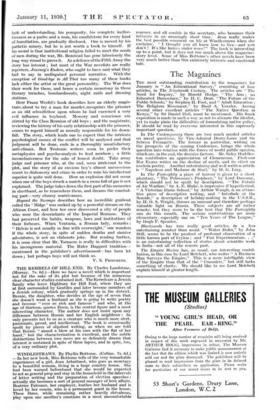Fiction
Sects, Conscience and Romance
AT the moment the mainspring of the greater part of American comedy is, what the Americans themselves would call a " nationwide " sensitiveness in regard to their mothers. The whole generation of younger novelists is united in the chorus, " My mother she's a Methodist, but I do the best I can." Everyone is bettering himself ; even the novelists are marching on towards the new gentility. They are sedulously teaching us that there are two kinds of Americans : those who live in small towns and worship Jehovah ; and the glorious misunder- stood who have ceased to live in small towns and, in vague emulation of the Athenians, worship the unknown' god, an immensely superior person. The Methodist Faun is an example of the hard, amusing, satirical comedy in which this state of affairs is revealed.
Faun-like in his adoration of nature, clumsily groping for achievement in painting and love, and attaining nothing better than small town photography—you observe Miss Parrish's values—and a nagging marriage, Clifford Hunter, is a thwarted and pathetic figure. He is an unhappy mixture of faun and Methodist. Every generous venture is frustrated by the ridicule and snobbery of those who have left the small town, or the comical narrowness of those who remain in it. His first love is- laughed at ; his marriage to the devout and hysterical young Sunday School teacher is a miserable failure. The puritan in him defeats the faun when escape in another love affair offers itself ; but the faun finds his apotheosis in death. One would like to think that the end of this essentially mediocre worshipper of trees and hills was tragic ; alas !
it is merely sentimentalized and pathetic.
The punishment of the pseudo-satirist is that only the people whom he despises are given life. Miss Parrish begins well, and her comedy is bright and malicious, but gradually the blight of her pitying approbation grows upon Clifford Hunter, and he becomes less and less interesting. She takes him to her bosom to spite the small town ; whereas a satirist ought to put his claws into everyone. However, swallow her senti- mentality, recognize her snobbery, and The Methodist Faun is an entertaining book, a considerable advance on All Kneeling, her previous novel.
The central character of Retreat, a regimental padre, is another failure, another mediocre soul whose end can awaken in the reader scarcely more than a shrug of the shoulders. The book deals with two debdcles : the retreat of the Fifth Army in 1918, and the demoralization of the padre who, driven back upon himself, and lacking the support of the outward and conventional manifestations of his religion, retreats gradually into insanity, denial of God, and death. Arriving in France on the eve of the German offensive he is at first terrified. Then begins a rather monotonous series of episodes in which his
lack of understanding, his pomposity, his complete ineffec- tiveness as a padre and a man, his candidature for every kind of humiliation, are gradually disclosed. One is moved by his pathetic misery, but he is not worth a book to himself. If his moral is that institutional religion failed to meet the needs of men during the war, Mr. Benstead has gone laboriously the long way round to prove it. As a defence of the Fifth Army the story has interest ; but most of the War novelists are really. reporters, Journey's Enders, who ought to have said what they had to say in undisguised personal narrative. With the exception of Good-bye to AU That too many of these books lack either the artist or the great personality. The War does their work for them, and hence a certain monotony in those literary trenches, bombardments, night raids and dressing stations.
Herr Franz Werfel's book describes how an elderly magis- trate, about to try a man for murder, recognizes the prisoner as an old schoolfellow upon whom he had exercised a very evil influence in boyhood. Memory and conscience are stirred by the Class Reunion of old boys ; and the magistrate, reviewing the history of his early relationship with the prisoner, comes to regard himself as morally responsible for his down- fall. The story, which leans one to expect that the intricate psychological causes of the conflict will be analysed and that judgment will be done, ends in a thoroughly unsatisfactory anti-climax. But Teutonic writers seem to prefer their metaphysics and psycho-analysis to lead nowhere ; a little inconclusiveness for the sake of honest doubt. Take away judge and prisoner who, at the end, seem irrelevant to the plot, and the story of an envious boy's almost unconscious resort to dishonesty and crime in order to ruin his intellectual superior is quite well done. How an explosion did not occur when one of the boys struck a match in a room full of gas is not explained. The judge takes down the first part of his memories in shorthand, as he remembers them, and dreams the conclud- ing part—very clumsy contrivances.
Beyond the Swamps describes how an incredible gunboat called the Midge ' was sucked up by a powerful stream on the African Coast, and how her crew discovered a city of people who were the descendants of the Imperial Romans. They had preserved the habits, weapons, laws /and institutions of their forbears.., When Venturia, a Roman lady, remarks : " Helvio is not usually so free with overweight," one wonders if the whole story, in spite of sudden deaths and sinister adventures, is not an elaborate joke. But reading further, it is soon clear that Mr. Tarnacre is really in difficulties with his incongruous material. The Rider Haggard tradition— mentioned in the. publisher's advertisement—has been let down ; but perhaps boys will not think so.
V. S. PRITCHETT.







































 Previous page
Previous page